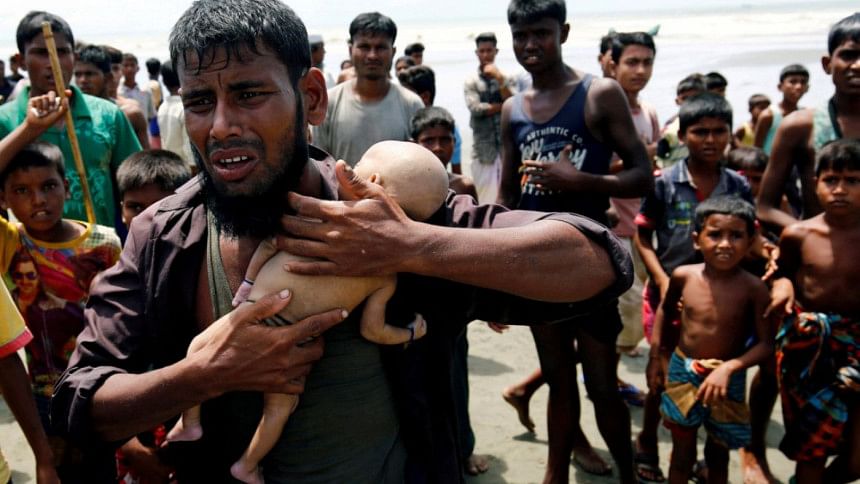Why China, Russia should back UN action against Myanmar

Political memories are wafer thin. Three years ago when the UN Security Council held a discussion on the occasion of the twentieth commemoration of Rwanda genocide, China and Russia joined other members of the council to air their voices against genocide. With their support the UNSC unanimously passed a strongly worded resolution renewing its commitment to fight against genocide.
But three years down the line, the global body now found the duo changed their stance to take action against what the UN termed "a textbook case of ethnic cleansing" in Myanmar. In March this year, China backed by Russia vetoed an UNSC resolution to censure Myanmar government for atrocities against Rohingya by the security forces. After eruption of the ongoing violence against Rohingya last month, China and Russia again sided with Myanmar. Their stance put the UN at a risk of being failed again to deliver on its core goal--prevention of genocide.
Lack of political commitment of the big nations enjoying veto power in the UNSC made the world body unable to stop genocides in some countries in past. But an appalling failure in Rwanda causing massacre of 800,000 people in only 100 days in 1994 forced the UN and other world leaders to seek apology for this.
READ MORE: UN Security Council meets Thursday on Rohingya crisis
Twenty years after the genocide in Rwanda, the Security Council in 2014 unanimously passed the resolution and condemned without reservation any denial of the genocide and called for international cooperation for timely prevention and punishment of the crime of genocide.
Before passage of the resolution, China and Russia along with other members of the UNSC issued strong worded statements against genocide and renewed its commitment to fight it.
Chinese diplomat Wang Min said the unprecedented carnage that occurred in Rwanda should be remembered forever. Lessons learned from the genocide in Rwanda had been considered by the international community to improvements in conflict prevention and resolution, he said.
"Preventing genocide also required that Governments protected their civilians and that all parties abide by humanitarian law. For its part, the international community should acquire a deep understanding of the situation on the ground, as well as strengthen coordination efforts for protecting civilians," he asserted.
The Russian diplomat, Vitally Churkin, said the tragic events in Rwanda should have and could have been prevented. The Second World War's harsh lessons learned from horrific Nazi actions against his and other countries had demonstrated that the signs of genocide should have been recognized in other situations. And yet, the international community had failed to see genocide as it unfolded in Rwanda, he added.
"The United Nations had truly betrayed Rwanda and the cost of inaction was 1 million lives. Those mistakes of the past must be corrected. It was important to among other things recognise and prevent incitement of violence over ethnic differences," he said.
The diplomat of France, Gerard Araud, though his country along with USA prevented the UN from intervening timely to stop Rwanda genocide also said the Security Council must renew its commitment to do everything possible, so that the lessons of the horrors of the past were not repeated.
The statements made by the diplomats of China and Russia demonstrated their concerns about genocide. But their present stance on Myanmar does not match with that spirit.
Ahead of the UNSC's today's meeting on Rohingya issue, the one positive thing is that in the wake of global outcry China and Russia has relaxed to some extent their stances on Myanmar two weeks before. This development helped the Security Council to issue a statement in middle of September asking Myanmar to end violence.
But the call fell flat. This means a mere call can not put enough pressure on the Myanmar government and military to stop atrocities against Rohingyas. The world body must take tougher actions like imposing sanction on Myanmar and for this support of China and Russia is a must. The duo should honour their commitment they made in 2014 along with other members of the Security Council and back the Security Council's move to take any strong action to end "the ethnic cleansing" in Myanmar. If they fail to do so, they will be blamed for the UN's failure to prevent the genocide in Myanmar as USA and France were held largely responsible for the global body's failure in Rwanda.

 For all latest news, follow The Daily Star's Google News channel.
For all latest news, follow The Daily Star's Google News channel. 



Comments